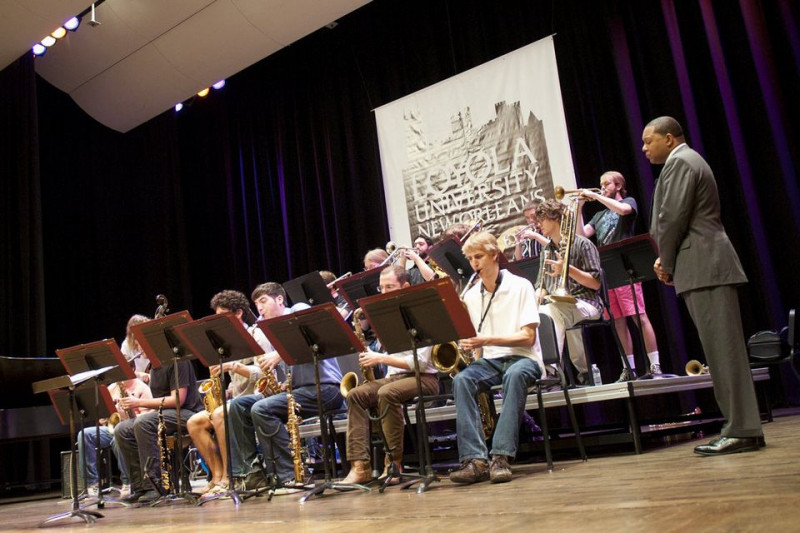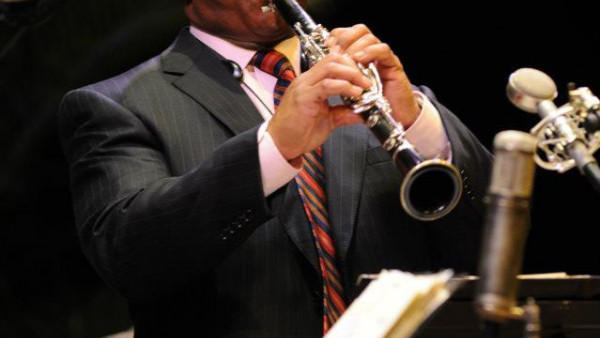Wynton Marsalis teaches Loyola jazz students lessons in music, life

(Photo by Erika Goldring)
Lost in concentration, Wynton Marsalis prowled the stage of Loyola University’s Louis J. Roussel Performance Hall, dissecting a student big band’s rendition of the jazz standard “Take the ‘A’ Train.” The New Orleans-born, Pulitzer Prize-winning jazz trumpeter did not necessarily like all that he heard.
“I want you to understand the spirit of what I’m saying,” Marsalis said before critiquing the students’ collective effort. “It’s not personal.”
He spent nearly two-and-a-half hours, longer than scheduled, conducting a master class with Loyola jazz students on the morning of Monday, Oct. 22; he would return to the same stage for a sold-out concert that night. The master class was closed to the public, but open to Loyola students. Around 100 students watched and listened as Marsalis lectured, coached and, eventually, performed with 18 of their classmates onstage.
Marsalis wore a perfectly tailored gray pinstripe suit, striped necktie, pressed shirt, cuff links and shiny black shoes. The student musicians, by contrast, sported a typical undergraduate array of shorts, jeans, T-shirts, tennis shoes and sandals. John Mahoney, coordinator of Loyola’s jazz studies program and conductor of the student band, opted for a corduroy sport coat and Tabasco-themed tie.
If Marsalis was underwhelmed by the students’ attire, he didn’t dwell on it. He had more important values to impart than a sartorial sense.
Stressing the importance of hearing what other musicians on the bandstand are doing, Marsalis asked if anyone could describe the lead trumpeter’s solo during “Take the ‘A’ Train.” “Who can give me any idea of what the trumpet soloist played? Can anybody tell me?”
No takers.
“Did anybody listen to the trumpet solo?”
Finally, freshman trumpeter Nathan Ward, seated next to the soloist on the bandstand, raised his hand. “I remember he played a whole-tone scale over the sharp five chord.”
Ward’s answer impressed Marsalis. “You get the gold star,” he said, as the audience erupted in applause. “In the years that I’ve been doing this, you’re the first person to actually say something that somebody did. I’m really not joking about that.”
He emphasized the importance of the relationship between the drums and bass. During “Take the A Train,” he observed, “no one in the rhythm section looked at each other.”
“Jazz music is a music of communication. It’s only about us listening to other people and trying to figure out what are they playing.”
He continued to press the point. “Did anybody actually listen to that piano solo? I didn’t feel it. Be honest about it. Don’t lie to me, now. Did y’all actually hear what the pianist was playing? Not really.”
Marsalis spoke with an amused, confident cadence, linking concepts, history, humor, politics, observation, music theory, philosophy, analogies, admonitions and affirmations. He compared ensemble playing to a legislative system, a lead trumpeter to the president.
He peppered his talk with personal anecdotes, such as being amazed by the amount of Duke Ellington music housed at the Library of Congress, or how he listened as Willie Nelson and Ray Charles discussed their common perspective on music.
Marsalis’ philosophical point of view has remained consistent for much of his career as the most-acclaimed living jazz trumpeter: True jazz is swing played in 4/4 time. Innovation is fine and good, but the repertoire of the great early twentieth century jazz composers and performers – the likes of Louis Armstrong, Duke Ellington, Jelly Roll Morton, Charlie Parker – is the greatest music America has ever produced. It is America’s classical music, and should be studied, learned and performed as such.
“Am I better than Louis Armstrong? That’s not possible,” he said. “Could he do everything that I can do? No. But why would he want to do that, when he could do all the things he could?”
After further discussion of “Take the ‘A’ Train,” Mahoney called out Bob Brockmeyer’s “Hello and Goodbye.” Marsalis halted the student band after a few bars. “What the lead trumpet was playing was very different from the rest of the band.”
He took a seat at the piano, demonstrating how the pianist might communicate with the drums and bass. He related the entire conversation he had in his head as he played along. “That’s democracy,” he said. “That’s what it’s about. … There’s nothing wrong with Twitter, nothing wrong with the computer. But the human being is what it’s about.”
Soloing to scales and otherwise “trying to apply science” is not the essence of music, he said. “Don’t cheat yourself. … The fun is in playing, not surviving.” Later, he demonstrated on trumpet how variations on the deceptively simple “Happy Birthday” could be a valuable exercise.
Science is not essential, but dedication is. “If you don’t want to practice, (play music) as a hobby – nothing wrong with that. But if you’re in a band, whether you know your parts is a matter of integrity.”
When Marsalis tours, he often conducts free daytime workshops for students from grade school through college. It’s all part of his mission to ensure that classic jazz is embraced and perpetuated by future generations.
His life revolves around that mission. Though he’s attended his share of soccer games, he said, his kids must adapt to his mission.
“I should have been gone 30 minutes ago,” he said as Monday’s class ran late. “But I’m still here. I’m dedicated.”
Keith Spera can be reached at [email protected] or 504.826.3470. Follow him on Twitter at KeithSperaTP.
By Keith Spera
Source: The Times-Picayune

